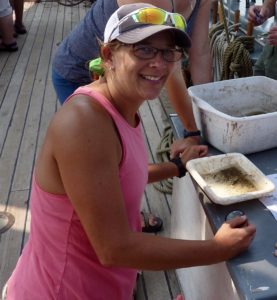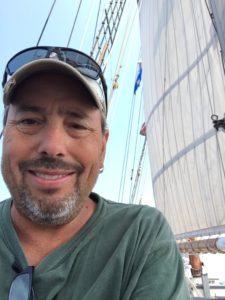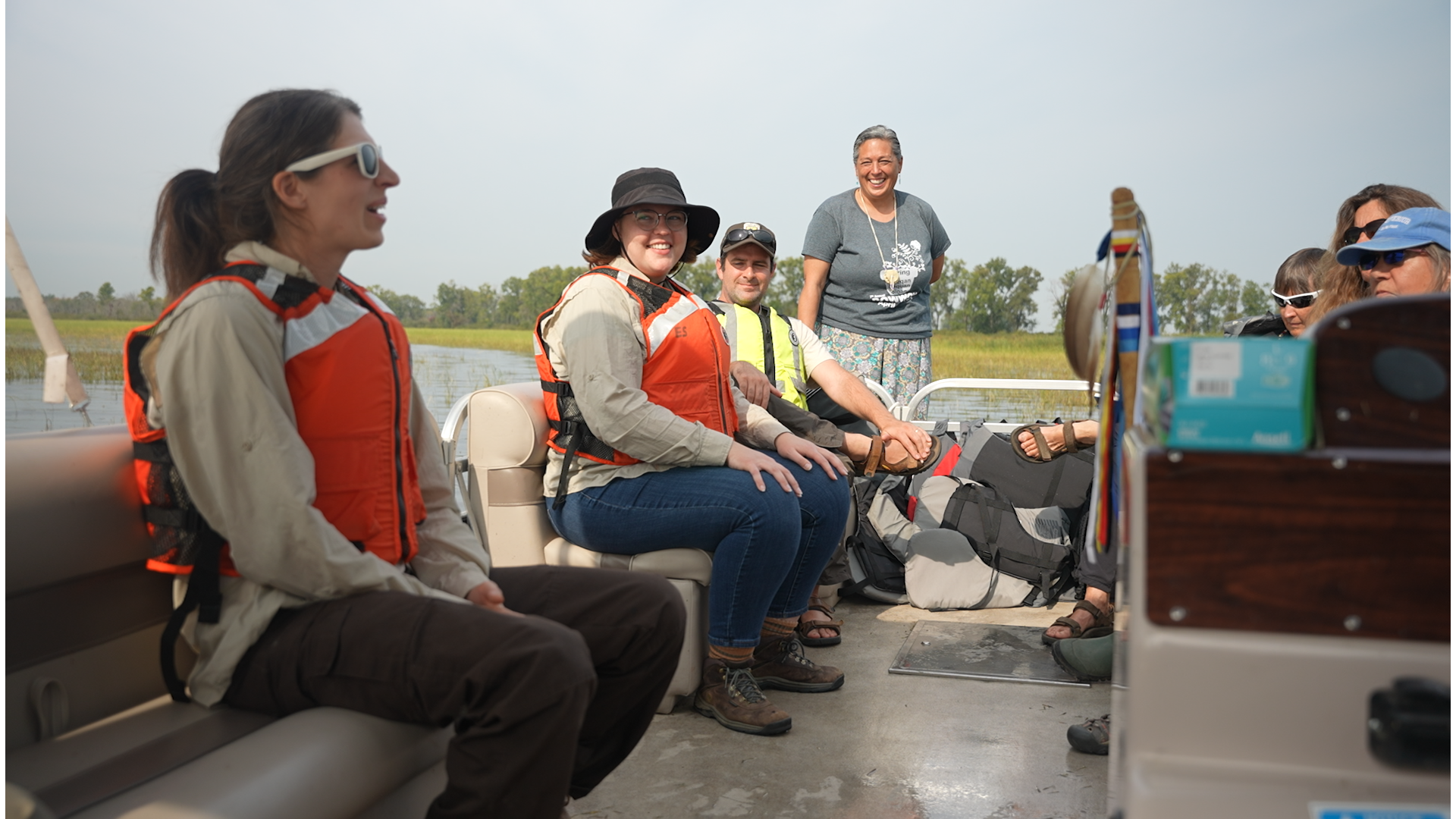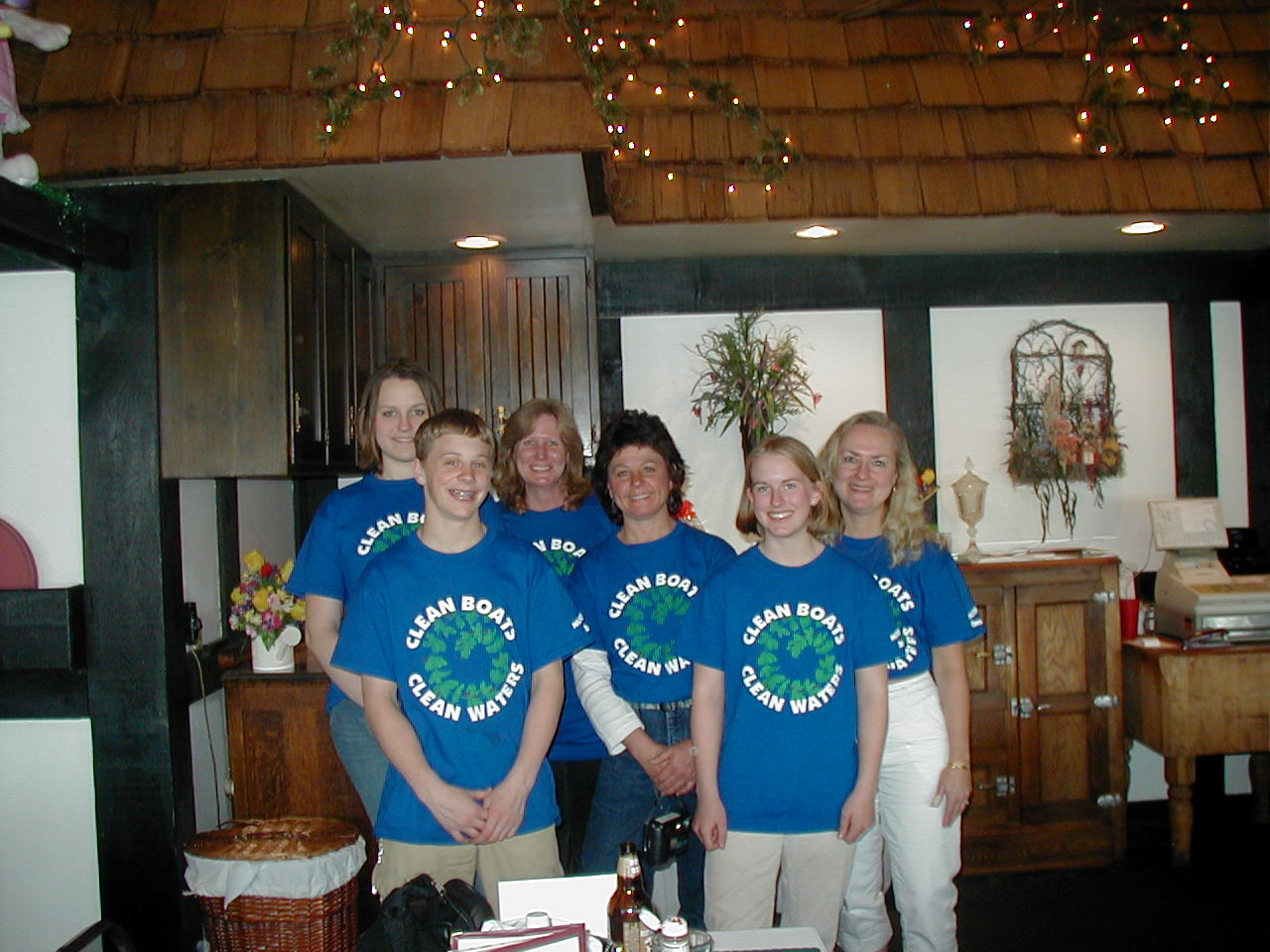Three Wisconsin teachers will join a dozen others from around the Great Lakes on a week-long research cruise on Lake Erie with scientists. Aboard the Environmental Protection Agency’s R/V Lake Guardian for a Shipboard Science Workshop hosted by the Center for Great Lakes Literacy (CGLL) and the Great Lakes Sea Grant Network, the teachers will learn the techniques scientists use to study large lakes.
When the teachers board the 180-foot modern ship in July, they’ll be building on an experience they had last summer on the historic, three-masted schooner, the Denis Sullivan. That science and maritime history cruise was also sponsored by the CGLL. One of the teachers works aboard the ship and the others learned about the Lake Michigan food web from Sea Grant outreach staff, and about maritime history from an archaeologist.
The lucky teachers are Jody Henseler, a seventh-grade science teacher from Wilson Middle School in Manitowoc; Brian Henrickson, a seventh-grade science teacher from L.B. Clark Middle School in Two Rivers; and Katie Riley, the education officer for the Denis Sullivan, which sails out of Milwaukee.

Jody Henseler
Henseler said that place-based education is what drew her to her first educational cruise aboard the Denis Sullivan and whet her appetite to learn about the other Great Lakes. “I wanted our kids to think about our town, which is on the shore of Lake Michigan. There hasn’t been a lot of place-based teaching done about the lake. I want the kids to understand that and to realize that Lake Michigan affects us in the springtime – it keeps us cooler. In the wintertime, it keeps us more moderate – we have more ice at that time of year. In the fall, we’ll stay warmer longer because of the lake. My goal is to help them care about Lake Michigan,” Henseler said.
Her favorite topic on last summer’s cruise was plankton, one of the tiny creatures that makes up the base of the food web. “It captured my interest and I spent a lot of time working with that,” Henseler said. “It was so cool, and I have a friend who is a natural science illustrator who has done an artist residency in northern Wisconsin. She chose to illustrate plankton – beautiful illustrations. I was like, okay, now I’m looking at these under a microscope and I’m connecting to what she had shown me that she created.”
Henseler brought her plankton passion back to her classroom. Her students learned about quagga mussels and how they are changing the ecosystem of Lake Michigan by consuming the plankton.
Henseler’s students also participated in activities with two instructors from the cruise. Wisconsin Sea Grant Fisheries Specialist Titus Seilheimer led them in a whitefish stomach dissecting activity so the children could see first-hand what the fish eat, and Wisconsin Historical Society Maritime Archeologist Tori Kiefer described how shipwrecks in Lake Michigan are found and mapped, which led the students to locate three shipwrecks off the shore of their school forest.
Her students also got to work underwater with remotely operated vehicles (ROV) that Henseler became familiar with during the Denis Sullivan cruise. She led an activity for 180 seventh-graders who used the Trident ROV in their pool. In another activity, they created coat-hanger ROVs from a kit that’s available through the Wisconsin Water Library.
The applicability of the Denis Sullivan activities made Henseler jump at the chance to go on the Lake Guardian cruise. “The opportunity came up to go and I’m like, hey – I want to go on a different Great Lake because I’ve never been on Lake Erie or near it. That would be really neat – to start going onto each of the Great Lakes to understand those ecosystems and how they are all connected.”
To that end, Henseler planned to stand up paddleboard on all of the Great Lakes in June this summer during her drive to the International Association of Great Lakes Research meeting in New York where she gave a presentation about the Sullivan cruise with Wisconsin Water Librarian Anne Moser and Minnesota Sea Grant Environmental Literacy Extension Educator, Marte Kitson.
“I planned out my trip so I’ll be going to the shore of all of the five Great Lakes and paddling for an hour or three hours, depending on conditions, which I thought was kind of a cool way to start my summer,” Henseler said.

Brian Henrickson
Henrickson said the Sullivan cruise fulfilled a lifelong goal. “It had always been a dream of mine to go on a three-masted schooner and learn how to sail the ship,” he said. “Then when they put that together with an educational experience for teachers to learn how to bring Great Lakes research and Great Lakes watersheds and ideas into the classroom, I thought, ‘This is a double-win.’ ”
Like Henseler, Henrickson brought his new knowledge of plankton into the classroom. “I teach my students that it’s the little things that we don’t see that go unnoticed and we don’t really know how that interacts in our world. I wanted to find new ways to bring those things to the students and let them explore the food web, invasive species, native species, and then the history – not only maritime history, but of the Great Lakes themselves,” Henrickson said.
On a field trip to the lake, Henrickson’s class captured plankton and brought it back to their lab to analyze it. They also studied invasive species, the formation of ridges and swales and fossil geology.
The upcoming Lake Guardian cruise fulfills another dream for Henrickson. “When I was growing up, one of my all-time goals was to take part in Jacques Cousteau’s boat, the Calypso. I watched his television show and wanted to be part of that. Now, as a teacher and scientist, I would like to see what technology we have to learn about the Great Lakes and how it’s changing. Now I’ll get my chance,” Henrickson said.
Riley coordinates education programs for the Sullivan, so a cruise aboard the more modern Lake Guardian is bound to offer a new experience. She was at sea doing her job, and so was unavailable for an interview.
The teachers will board the Lake Guardian in Cleveland on July 8. The ship will stop in Erie, Pennsylvania, and Put-in-Bay, Ohio, before the teachers disembark in Cleveland on July 14.
Henrickson is excited to get out onto Lake Erie, but stressed to his class that it won’t be a pleasure excursion. “We talked about the trip, and I said, ‘This is not just a boat cruise here. We are going to be working on this ship.’ If I could bring some of that back there to show them, that’s what I’d like to do – to give the kinds the wheel, so to speak – the chance to develop their own projects about plankton or the food web.”
This Shipboard Science Workshop is coordinated by the Great Lakes Sea Grant Network and the U.S. Environmental Protection Agency’s Great Lakes National Program Office. Funding comes from the Great Lakes Restoration Initiative.





